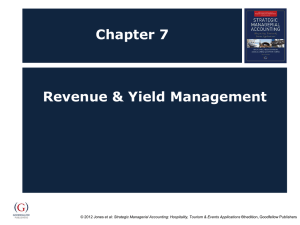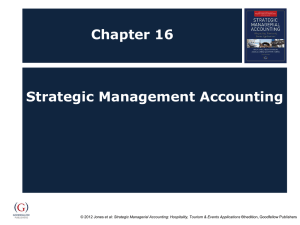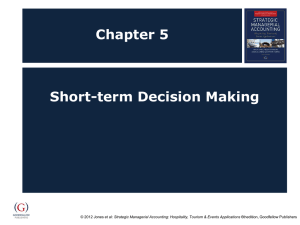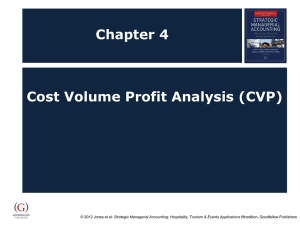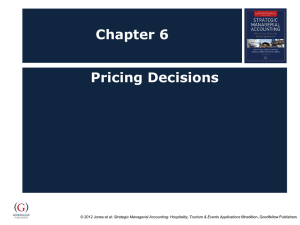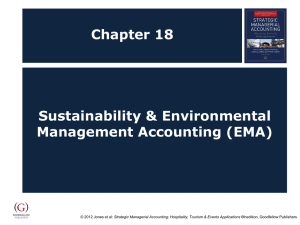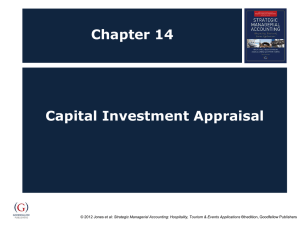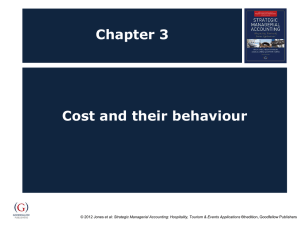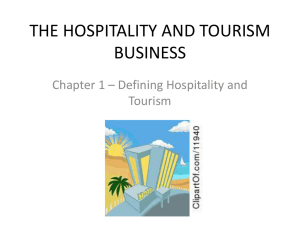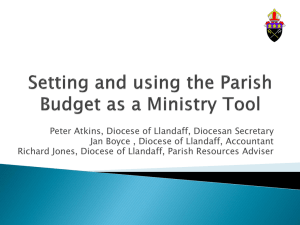Chapter 9 - Goodfellow Publishers
advertisement
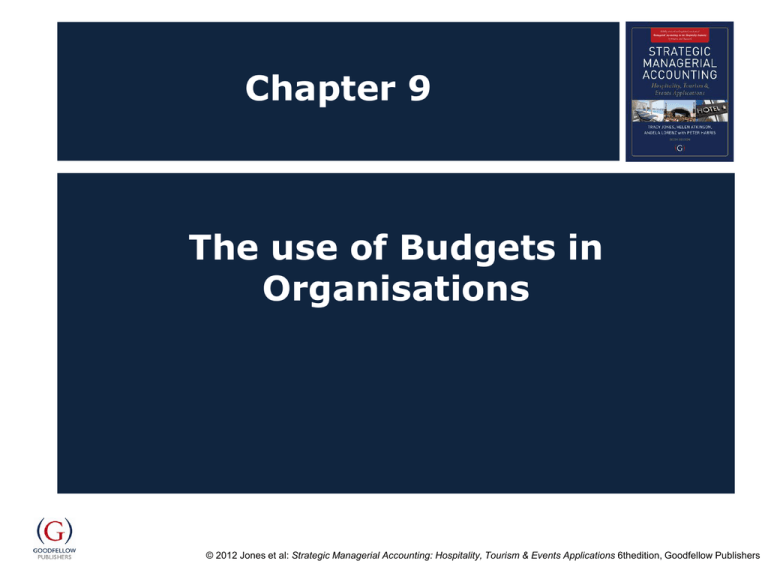
Chapter 9 The use of Budgets in Organisations © 2012 Jones et al: Strategic Managerial Accounting: Hospitality, Tourism & Events Applications 6thedition, Goodfellow Publishers Objectives After studying this topic you should be able to: explore the development of budgeting consider the role of budgets within organisations develop budget preparation skills consider the behavioural implications of budgeting evaluate the use of budgets in contemporary business environments © 2012 Jones et al: Strategic Managerial Accounting: Hospitality, Tourism & Events Applications 6thedition, Goodfellow Publishers Identify & set objectives Collect data and analyse data for alternative courses of action Select course of action Execute long-term plan in annual budget plan Compare actual results with budget Investigate variances and take corrective action Annual budgetary control process Long-term Planning Process The Relationship between long-term and short-term budgeting © 2012 Jones et al: Strategic Managerial Accounting: Hospitality, Tourism & Events Applications 6thedition, Goodfellow Publishers The role of budgets Planning Control Measure performance Communication Coordination Motivation © 2012 Jones et al: Strategic Managerial Accounting: Hospitality, Tourism & Events Applications 6thedition, Goodfellow Publishers Master budget preparation Should the budget be prepared for a fixed financial year, or be a rolling budget? Is the best approach ‘top-down’, or ‘bottom-up’? Do we need a budget committee or a budget manual? Should we use a fixed or flexible budget? Should an incremental or zero based approach be used? © 2012 Jones et al: Strategic Managerial Accounting: Hospitality, Tourism & Events Applications 6thedition, Goodfellow Publishers Limiting Factors Capacity Customers Labour Management Capital © 2012 Jones et al: Strategic Managerial Accounting: Hospitality, Tourism & Events Applications 6thedition, Goodfellow Publishers Classification of Budgets Operating Budgets Capital Budgets Sales revenue Cost of Sales Payroll & related expenses Other departmental expenses Undistributed operating expenses Fixed Charges Capital Expenditure Inventory Debtors (receivables) Creditors (payables) Master Budget (Budgeted financial statements) Income Statement Statement of Financial Position Cash Budget © 2012 Jones et al: Strategic Managerial Accounting: Hospitality, Tourism & Events Applications 6thedition, Goodfellow Publishers Cash Budgeting A cash budget gives a useful overview of the inflow and outflow of cash in the budgeted period. This can forewarn management as to when cash is short, when an overdraft needs to be arranged, etc. Equally, in times of plentiful cash short-term investments might be considered to keep the cash working for the business. © 2012 Jones et al: Strategic Managerial Accounting: Hospitality, Tourism & Events Applications 6thedition, Goodfellow Publishers Budgeting Example (1) See textbook for full details for the full example data © 2012 Jones et al: Strategic Managerial Accounting: Hospitality, Tourism & Events Applications 6thedition, Goodfellow Publishers Budgeting Example (2) See textbook for full details for the full example data © 2012 Jones et al: Strategic Managerial Accounting: Hospitality, Tourism & Events Applications 6thedition, Goodfellow Publishers Budgeting Example (3) See textbook for full details for the full example data © 2012 Jones et al: Strategic Managerial Accounting: Hospitality, Tourism & Events Applications 6thedition, Goodfellow Publishers Budgeting Example (4) See textbook for full details for the full example data © 2012 Jones et al: Strategic Managerial Accounting: Hospitality, Tourism & Events Applications 6thedition, Goodfellow Publishers Budgetary control Producing a budget can give many advantages, but it has to be a working document and utilised within the operation routinely to have a control function It shows managers how they are doing in relation to the set targets It gives information to where operational issues might exist to aid management in operational control of the business This involves a comparison of budget to actual data to identify variances © 2012 Jones et al: Strategic Managerial Accounting: Hospitality, Tourism & Events Applications 6thedition, Goodfellow Publishers Variances Variances are always discussed in relation to their impact on profit. All else being equal, does the variance have an adverse (A) or favourable (F) impact on profit? From a management perspective focus needs to be paid to ‘significant variances’. Variance: Impact on profit: Revenue up Favourable Revenue down Adverse Specific cost up Adverse Specific cost down Favourable © 2012 Jones et al: Strategic Managerial Accounting: Hospitality, Tourism & Events Applications 6thedition, Goodfellow Publishers Sid's Spit Roast Sid produces a budget and then compares this with the actual results: Sales Revenue Food costs Gross Profit Budget £13,500 % 100% Actual £12,000 % 100% Variance £1,500 A % 11% £4,500 £9,000 33% 67% £4,200 £7,800 35% 65% £300 F £1,200 A 7% 13% This does not answer all of Sid’s management questions though Why has the sales revenue gone down? – difference in sales volume, selling price, or both? Why has the food cost gone down? – as a variable cost, is it still the same per unit, but we sold less? – is it the quantity of ingredients used (portion size)? – or the price per kg that has changed? Clearly it is these questions that need to be answered, but to do this we need more information and to use a flexed budget to assist. © 2012 Jones et al: Strategic Managerial Accounting: Hospitality, Tourism & Events Applications 6thedition, Goodfellow Publishers Flexed Budgets Sid in his original budget planned to sell 3,000 units in reality he only sold 2,500 individual units – with this additional information a flexed budget can be used to give us far more information to analyse the situation. Per unit Original Budget 3,000 Flexed Budget 2,500 Actual 2,500 Flexed to actual Variance Sales Revenue Food costs £4.50 £13,500 £11,250 £12,000 £750 (F) £1.50 £4,500 £3,750 £3,800 £50 (A) Gross Profit £3.00 £9,000 £7,500 £8,200 £700 (F) © 2012 Jones et al: Strategic Managerial Accounting: Hospitality, Tourism & Events Applications 6thedition, Goodfellow Publishers Reconciliation statement Sid’s spit roast can calculate many individual variances from the flexed budget, as detailed on pages 134-136. These are then summarised in a profit reconciliation statement. © 2012 Jones et al: Strategic Managerial Accounting: Hospitality, Tourism & Events Applications 6thedition, Goodfellow Publishers Responsibility accounting Cost Centers Revenue Centers Profit Centers Investment Centers © 2012 Jones et al: Strategic Managerial Accounting: Hospitality, Tourism & Events Applications 6thedition, Goodfellow Publishers Transfer pricing Goods and services transferred between divisions have to be priced so that the supplying division gets the credit; this then becomes a cost to the receiving division. A transfer price may be set at cost, or include some form of profit – examples include a transfer price at variable cost, full cost, cost plus profit, market price, or a negotiated price. © 2012 Jones et al: Strategic Managerial Accounting: Hospitality, Tourism & Events Applications 6thedition, Goodfellow Publishers Beyond budgeting/better budgeting – Problems of traditional budgets (1) The change of pace in business – can we any longer produce a fixed budget for a year ahead, given rapid changes in the world we need to react to? Budgets restrict entrepreneurial risk taking – this could have a negative impact on long term business growth. Budgetary control can be inward looking – the external issues in the market and comparative analysis of competitors are seen as vital in modern business. © 2012 Jones et al: Strategic Managerial Accounting: Hospitality, Tourism & Events Applications 6thedition, Goodfellow Publishers Beyond budgeting/better budgeting – Problems of traditional budgets (2) Traditional budgeting can lead to ‘budgetary gamesmanship’ – this can lead to managers actions that are not in the best long term interest of the firm as a whole. Budgets are time consuming to produce – on a cost versus benefit basis are they valuable? Departmental barriers can be encouraged in budgets, often with competing targets – does this maximise the returns for the business as a whole? © 2012 Jones et al: Strategic Managerial Accounting: Hospitality, Tourism & Events Applications 6thedition, Goodfellow Publishers Beyond budgeting Beyond Budgeting believed firms should move ‘beyond budgets’ and look for alternative ways of planning and control in organisations. See www.bbrt.org for the positive view of moving beyond budgeting © 2012 Jones et al: Strategic Managerial Accounting: Hospitality, Tourism & Events Applications 6thedition, Goodfellow Publishers Better budgeting Better budgeting view traditional budgets could be adapted to meet the needs of modern industry. The CIMA 2004 report gives many views on budgeting, better budgeting & beyond budgeting (reference on p145 in textbook) © 2012 Jones et al: Strategic Managerial Accounting: Hospitality, Tourism & Events Applications 6thedition, Goodfellow Publishers Summary Budgets have existed for over a century within organisations. Budgets have many roles, including aiding; planning, control, performance measurement, communication, coordination, and motivation. There are a number of limiting factors when budgeting such as; physical capacity, customer demand, labour availability, management ability, or capital available. A master budget combines all individual operating and capital budgets. Cash is the life blood of an organisation, so the cash budget is an important document in addition to the income statement and statement of financial position. © 2012 Jones et al: Strategic Managerial Accounting: Hospitality, Tourism & Events Applications 6thedition, Goodfellow Publishers Summary Being able to identify ‘significant’ variances is an important aspect of budgetary control. Flexed budgets aid control when the sales volume is not as predicted in the original budget. Responsibility accounting aids the ability to match financial statements to the individual elements a specific manager is responsible for and has the ability to influence/control. Beyond budgeting and better budgeting are alternative ways of overcoming weaknesses with traditional budgeting. Beyond budgeting is not a method of budgeting, it is an alternative that does not use a budget. © 2012 Jones et al: Strategic Managerial Accounting: Hospitality, Tourism & Events Applications 6thedition, Goodfellow Publishers
